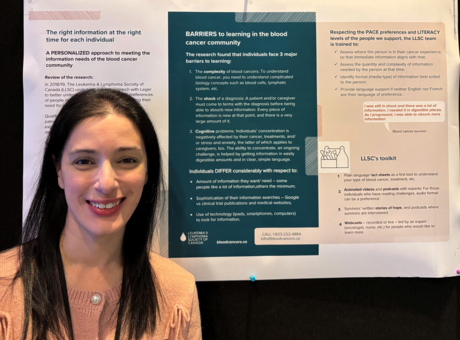Canadian Association of Psychosocial Oncology (CAPO) 2025: Care of the soul in cancer
We were delighted to have the opportunity to participate again in the annual conference of the Canadian Association of Psychosocial Oncology (CAPO). More than 300 people from the psychosocial profession in the oncology field, advocates with lived experience, and community partner organizations focused on cancer, attended CAPO 2025 in Toronto, which marked CAPO’s 40th anniversary.
LLSC was represented at the event by one of our community services leads in Ontario, Daniela Sinisi, shown here at the LLSC’s research poster displayed at CAPO 2025 – highlighting our market research on how the blood cancer community prefers and needs information to be delivered to them.
The following are Daniela’s insights on her time at CAPO 2025:
This year’s conference theme was “responding to the human experience of cancer and caring for the soul.” Several talks emphasized that although the medical/clinical side of oncology is crucial, so is the psychosocial side, and there needs to be more awareness and funding put towards healing the whole person, not just the body.
I had the opportunity to attend a few keynote presentations as well as smaller oral presentations. A few of my highlights include:
Keynote speaker Belinda Smith, a cancer survivor and Board member of CAPO, spoke about how treatment has a start and end date, whereas psychosocial support is ongoing and can be needed many years after an initial diagnosis. A few things she said stood out for me. “I was prepared for death, but not prepared for survival,” and “I needed to figure out who the new me was,” and “coping can be lonely and exhausting.”
Keynote speaker Thomas Moore, author of “Care of the Soul in Cancer,” university professor, and psychoanalyst for 40+ years. Thomas spoke about how we are not just a body; we have deep feelings and relationships; he emphasized that if we want to care for others, ‘carrying their story’ is equally as important as giving medication. Creating these meaningful connections with others, whether our constituents, colleagues, family, or friends, is so important and does not take much time, but can have a profound impact.
'Carrying their story'
This really resonated with me because “carrying their story” is what the community services team at LLSC does daily by offering a safe, non-judgmental, and compassionate space for our community to be heard and cared for.
I also had great conversations with psychosocial professionals in oncology, as well as other healthcare providers. In fact, there was a joint symposium held by CAPO and the Canadian Association of Nurses in Oncology (CANO) about re-imagining healthcare to deliver humanistic, psychosocial, and palliative care to underserved and structurally vulnerable populations.
I attended some 20-minute oral presentations about survivorship:
- Adaptive functioning in survivors of childhood cancer and healthy controls
- Beyond Survival: Mental health, executive functioning, and pain in survivors of acute lymphoblastic leukemia (ALL) and their siblings
- Pain in young people treated with hematopoietic stem cell transplant for sickle cell disease in childhood: A qualitative examination
I also attended a symposium on caring for those who care for adolescents and young adults (AYA): navigating grief and loss in cancer, including the session, “Lavender alert as a necessary tool in caring for AYA oncology patients.” Also known as Code Lavender, the alert is a formalized, brief rapid response to emotional distress experienced by healthcare providers and support staff.
I spent time talking to my peers at other community service organizations who were exhibitors: Look Good Feel Better; Nankind; Campfire Circle; Wellspring Cancer Support; Inspire Health Supportive Cancer Care; Canadian Cancer Society; and Melanoma Canada.
